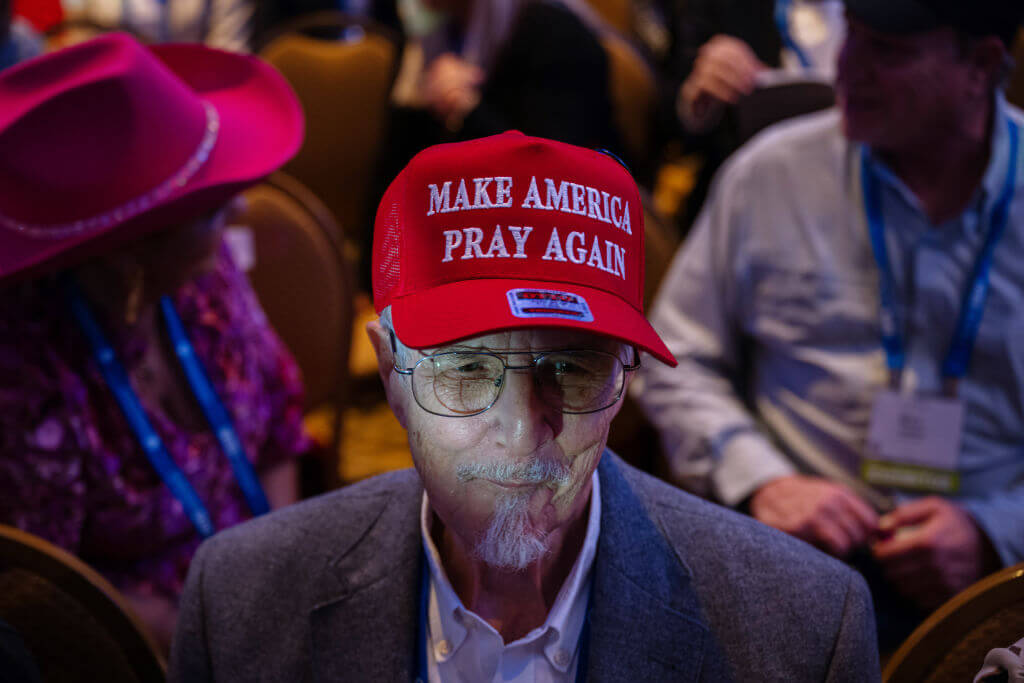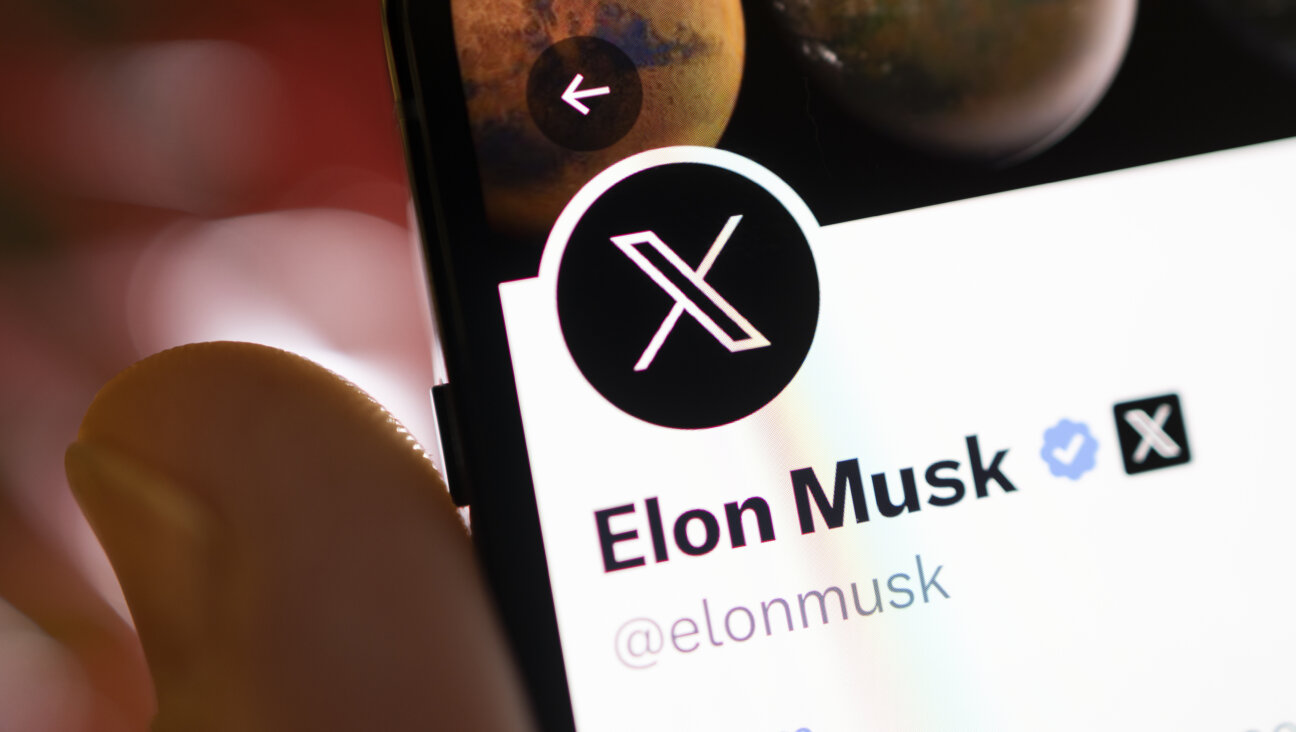Elon Musk’s Jewish problem
The world’s richest man has adopted an approach to Jews informed and augmented by the far right, with seemingly contradictory positions that are more consistent than they at first appear.
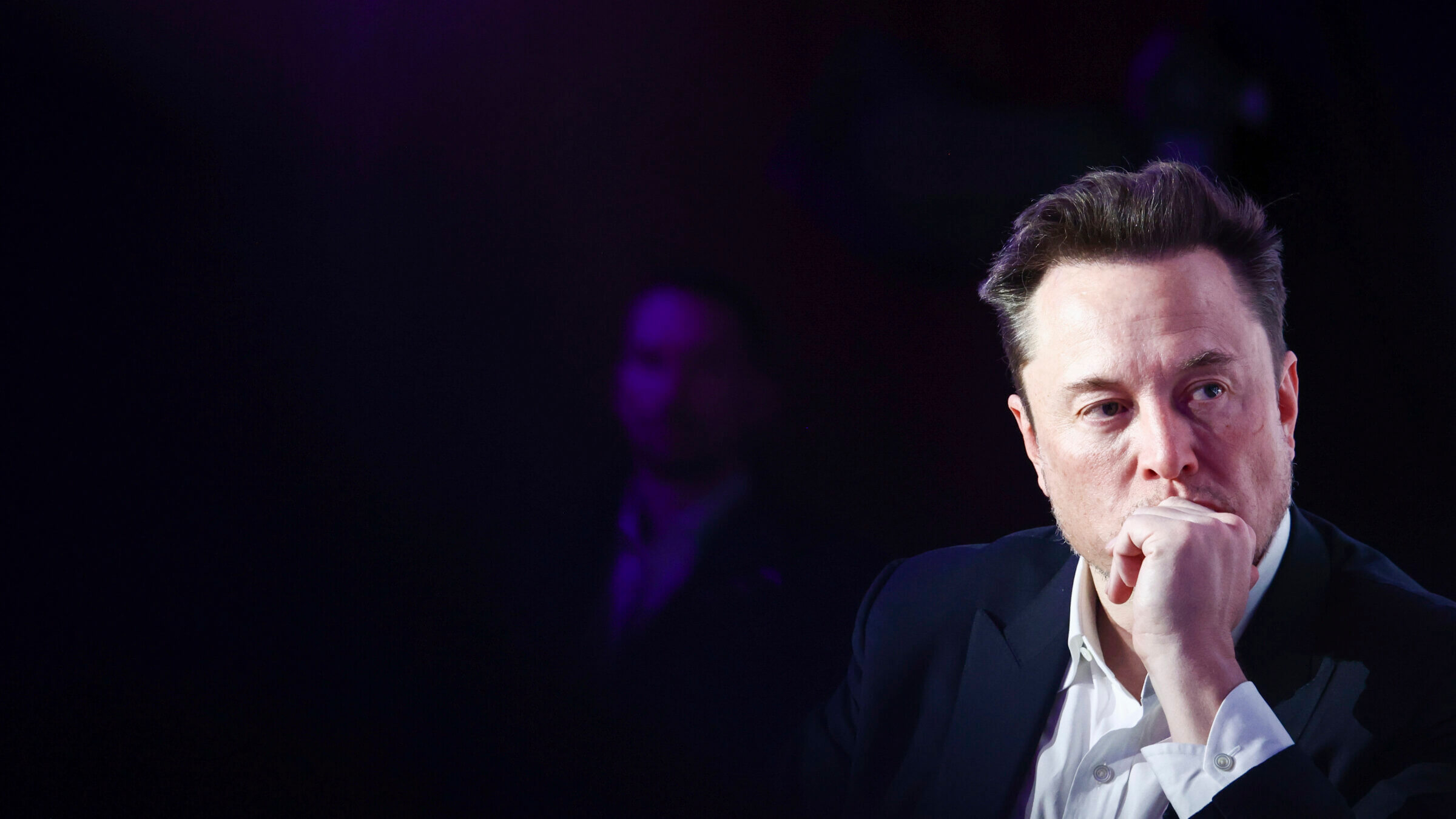
Elon Musk on stage at a symposium about antisemitism in Krakow, Poland, in January 2024, following a visit to Auschwitz. The trip followed a controversy of Musk’s endorsement of an antisemitic post on X, the social media platform he owns. Photo by The Associated Press
When Elon Musk raised his arm in what many considered a Nazi salute during an inauguration rally for President Donald Trump, the moment became a Rorschach test for Jews. His actions were either proof positive of longstanding suspicions that Musk was an antisemite who had just performed a sieg heil; or the entire controversy was a nasty smear against a man who has proven himself to be a friend of the Jews.
As Musk, the world’s richest man, seeks to reshape the federal government with Trump’s backing, each side musters evidence: Musk has shared memes on social media featuring Nazi soldiers and connected to white supremacy, but also made a pilgrimage to Auschwitz. He is obsessed with the power of liberal philanthropist George Soros and the Anti-Defamation League, but one of his top advisers is Jewish and he has met several times with the Israeli prime minister.
The tech billionaire, who owns Tesla, X and SpaceX, among other companies, has highlighted these contradictions as proof that it is “absurd” to claim he is antisemitic. He even ran a December poll on X, the social platform he renamed from Twitter, asking users whether he was a “Zionist puppet,” an “antisemite” or “somehow both!?”

Most users chose a fourth option: “Lmaooo,” internet slang for raucous laughter.
Many of Musk’s defenders see his flirtation with the antisemitic far right as the excesses of a man who enjoys provocation but harbors no animus toward Jews. Rabbi Menachem Margolin, who toured Auschwitz with Musk last year, defended the Holocaust jokes Musk made last month after the salute.
“I don’t think he thinks that Nazis or the Shoah is a joke,” Margolin said in an interview. “If you want to say he was using black humor — OK, I see many Jews who do similar things.”
But rather than understanding Musk’s relationship to Jews as a series of clashing data points, a careful examination of his statements suggests a consistent approach to antisemitism informed and augmented by the far-right milieu he participates in online. This approach is not limited to Musk; it is characteristic of many people in Trump’s orbit, including some Jews.
Vice President JD Vance toured the Dachau concentration camp last week — and the next day, encouraged European governments to be more inclusive of far-right political parties, including the Alternative for Germany, one of whose leaders has been fined twice for using Nazi slogans banned in his country. Darren Beattie, a former White House speechwriter and self-described “proud Jew,” spoke at a white nationalist conference days before Trump was elected in 2016. Trump himself has said he would be “the best friend Jewish Americans have ever had in the White House” and that any Jew who didn’t vote for him “hates their religion.”
But Musk, who did not respond to requests for an interview made through the White House, is the most powerful and visible representative of this dynamic.
He has close relationships with Jews who share his view that ethnic minorities and the left are the prime source of antisemitism — and that the “woke mind virus,” which he has dedicated himself to eradicating, poses a danger to Jews.
At the same time, Musk has repeatedly demonized Jews who reject those ideas and focus their anxiety instead on the antisemitism of white nationalists whose views Musk amplifies on X.
Two years ago, for example, Musk wrote on X that the Anti-Defamation League, and many Jews, attack “the majority of the West, despite the majority of the West supporting the Jewish people and Israel” because “they cannot, by their own tenets, criticize the minority groups who are their primary threat.”
“It is not right and needs to stop.”
Ben Lorber, who monitors white nationalism for Political Research Associates, a progressive think tank, said it is common for those on the far right who avoid explicit racism to embrace antisemitic conspiracies and blame liberal Jews for supporting policies like mass migration.
“It’s not as contradictory as it might seem,” Lorber said. “They might have warm feelings about the Jews in their lives — and they might be philosemitic in some ways — but antisemitic elements of this worldview are very comfortable for them.”
Oren Segal, who runs the ADL’s Center on Extremism, is skeptical of the line Musk has sought to draw between his avowed support for Judaism and some Jews and open animosity toward others. He pointed to Louis Farrakhan, the Nation of Islam leader who once sought to defend himself against accusations of antisemitism by saying he was seeking to “separate the good Jews from the Satanic Jews.”
“This idea that some people make a distinction between good Jews and bad Jews in and of itself is absurd,” Segal said. “How are they making that assessment?”
Down the rabbit hole
Even before Musk bought Twitter three years ago, some critics were worried about his penchant for conspiratorial posts that played on antisemitic tropes. In 2018, after he tweeted, “Who do you think *owns* the press? Hello,” Ben Collins, a disinformation reporter at NBC News, replied: “Uhhh Elon where are you going with this?”
The query would prove prescient. Musk was headed gradually — and then suddenly — down an online rabbit hole toward overt antisemitism. That journey reached an apex on Nov. 15, 2023, just a month after the Israel-Hamas war began and sparked a wave of antisemitism throughout the diaspora.
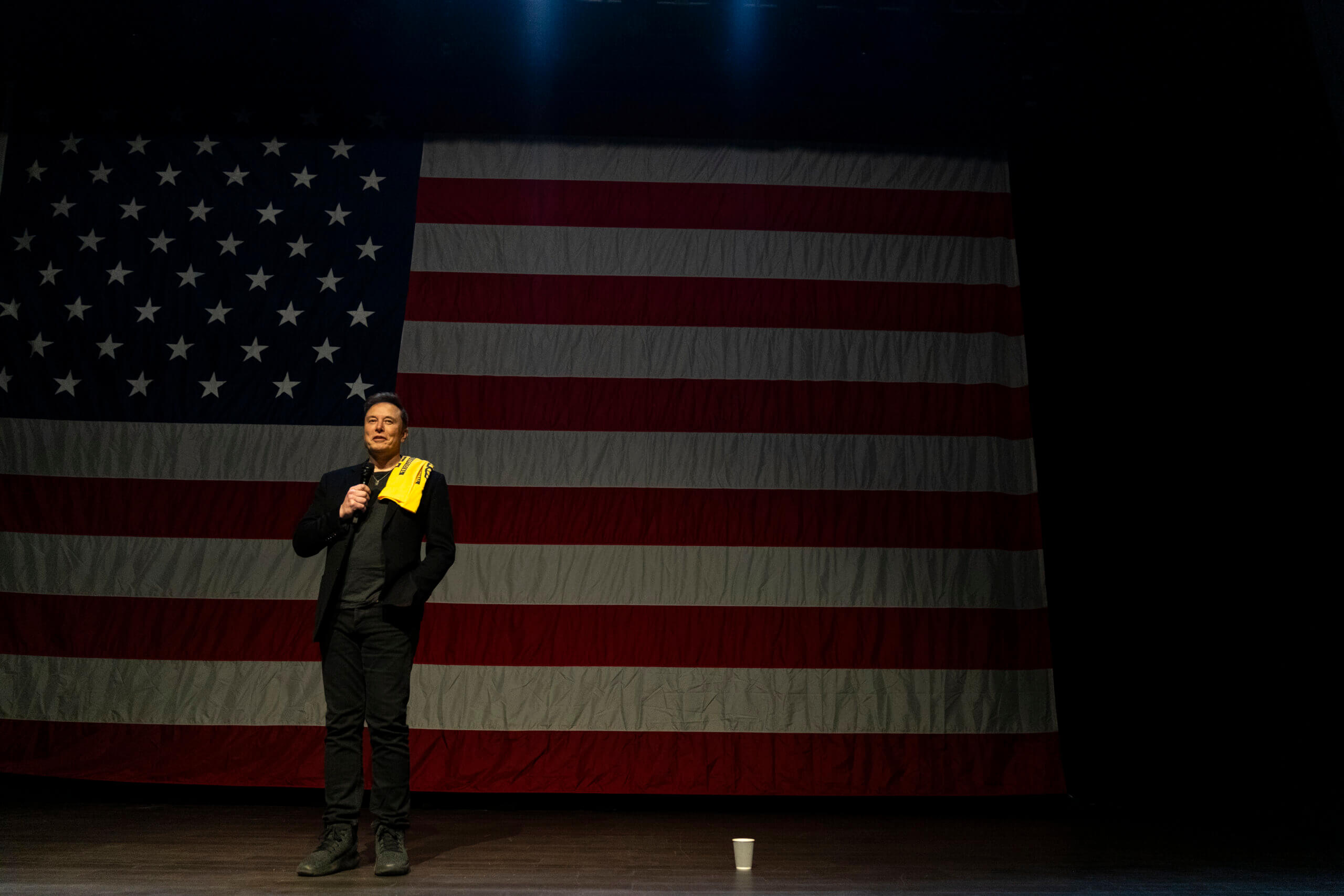
An anonymous user calling himself Eric had replied to a PSA about antisemitism by saying “Jewish communities have been pushing the exact kind of dialectical hatred against whites that they claim to want people to stop using against them.”
Musk chimed in an hour later. “You have said the actual truth,” he told Eric.
The incident received widespread media coverage, and two weeks later Musk apologized.
“Essentially, I handed a loaded gun to those who hate me — and arguably to those who are antisemitic, too — and for that I’m quite sorry,” Musk said during a New York Times interview. “That was not my intention.”
But Musk also complained that journalists had ignored the subsequent posts where he explained that liberal Jews are too afraid to criticize minorities and so instead attack whites.
One of Musk’s top advisers is David Sacks, a Jewish South African who helped him take over Twitter and, reports say, encouraged him to become more active in Republican politics. And for months after buying X, Musk avoided any direct discussion of Jews. But Lorber, who analyzes the far right, said Musk had been steeped in anti-Jewish conspiracy theories on social media for years.
“That stuff is just in the background for someone like Musk,” he said. “He’s swimming in it.”
At least part of Musk’s obsession with what he views as malevolent Jewish forces in society — especially Soros and the ADL — seemed to emerge when they affected his personal fortune. Musk’s most intense attack on Soros, the billionaire Jewish investor and philanthropist, came shortly after news broke that Soros had liquidated his $20.1 million worth of Tesla shares in May 2023.
Two days later, Musk wrote that Soros “hates humanity” and “wants to erode the very fabric of civilization.” He’s since posted about Soros more than 100 times.
And Musk only turned on the ADL after he blamed a short-lived boycott the group organized for advertising revenue on X tanking.
In August 2022, an Irish white nationalist named Keith Woods, who described himself as a “raging antisemite,” drew Musk into a campaign against the ADL. “Why should they have a platform on X to hold @elonmusk to ransom?” Woods wrote on X. “It’s time to #BanTheADL.”
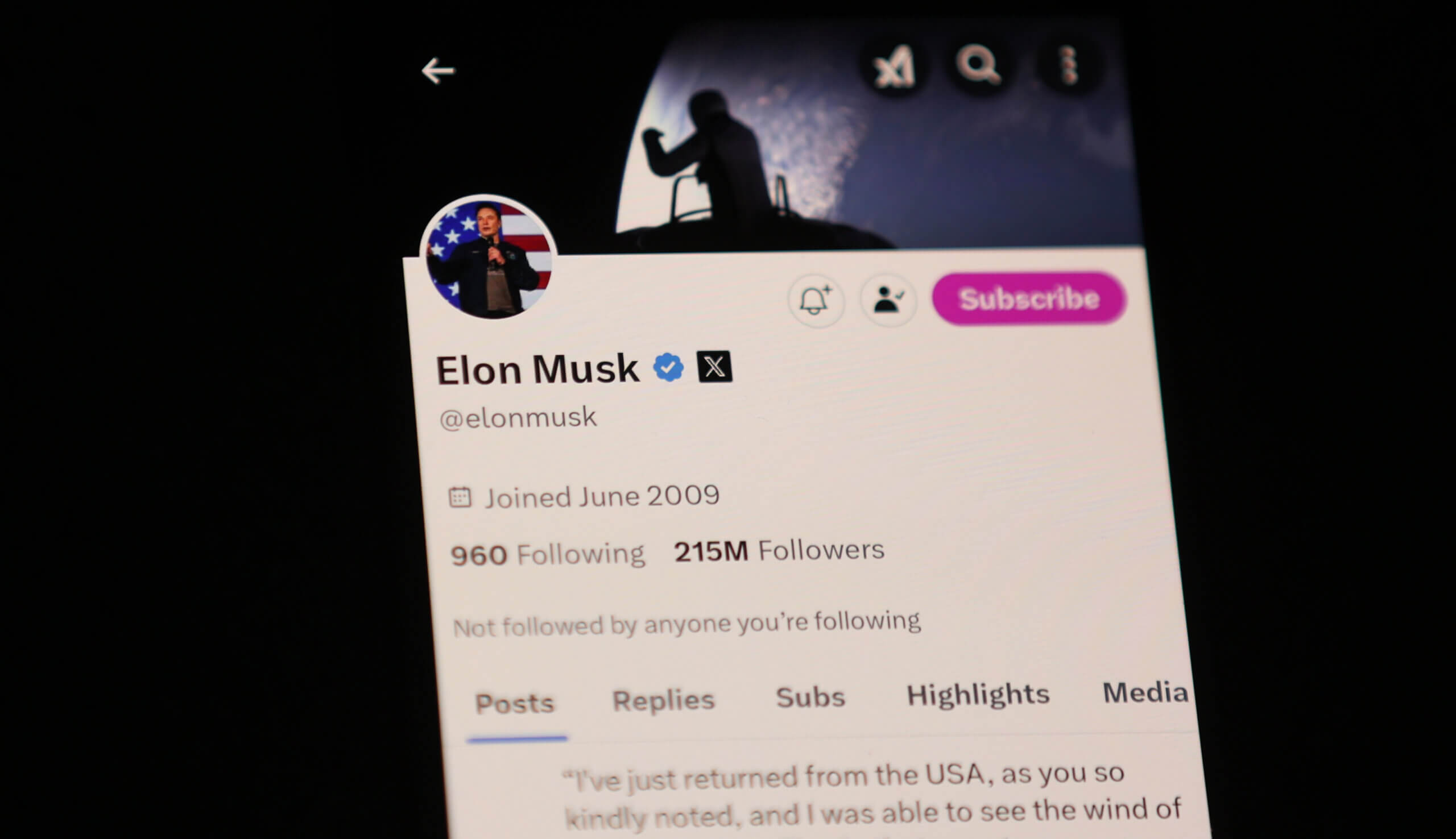
Musk “liked” the post from Woods and was quickly interacting with white nationalists and antisemites and pondering a defamation lawsuit against the ADL, claiming that it had been “hijacked by the woke mind virus.”
His patchwork theories about Jews and antisemitism unfolded as part of this feud. When Musk participated in a 90-minute live audio chat on X hosted by Ben Shapiro, the conservative pundit and Orthodox Jew, during the #BanTheADL controversy, Shapiro emphasized that there was nothing wrong with being “at war with the Anti-Defamation League” over its political orientation or positions on hate speech. “Elon happens to be right on the merits,” Shapiro said.
But following that conversation, Musk broadened his critique about Jews targeting white people rather than minorities as the greatest threat to their safety. “This does not extend to all Jewish communities,” he said during the exchange with Eric, the anonymous user who kicked off the controversy. “But it is also not just limited to ADL.”
From climate hero to far-right troll
Musk, 53, was raised in apartheid South Africa. His maternal grandfather was a notorious racist and antisemite. His father, Eroll, owned an emerald mine and held a contemptuous view of the country’s Black majority. “With no whites here, the Blacks will go back to the trees,” Eroll told Elon in a 2022 email.
But until a few years ago, Musk proudly described himself as a centrist and regularly donated to Democrats, including Hillary Clinton’s presidential campaign in 2016. Tesla, his electric car company, was the darling of liberals worried about climate change, and Musk also owned SolarCity, a green energy company.
“I’m openly moderate,” Musk tweeted in 2019. “There, I said it.”
Something began to shift during the pandemic. Musk’s companies were facing increased pressure from government regulators and, alongside what The Wall Street Journal reported was heavy use of illegal drugs, Musk started expressing skepticism about the COVID-19 vaccine as well as immigration and trans rights.
His new posts were popular. One calling the panic over coronavirus “dumb” was his first to exceed 1 million likes. Many of the users who responded to him were also spreading far-right conspiracy theories. Musk began talking about sinister forces silencing conservatives on social media.
Twitter — and now X — users communicate in short and sometimes cryptic snippets of text, so it can be hard to tell when Musk was engaged in arch trolling and when he was serious. Sometimes it seemed to be both.
After complaining about censorship on Twitter, Musk offered to buy the company in April 2022 with a $54.20-per-share offer, which many interpreted as a weed joke (4/20 is a reference to cannabis culture, and Musk submitted financing documents for the deal on April 20). But Musk did, ultimately, purchase Twitter.
Musk started expressing more radical views after the deal closed. He said, for example, that Democrats supported immigration as a means of “importing future left-wing voters,” a variation of the great replacement theory, which has antisemitic origins.
Many of the accounts Musk started bantering with also trafficked in antisemitism. One called @iamyesyouareno, with over 400,000 followers, has frequently made disparaging comments about Jews, including that the media is “owned by Jews.”
@EndWokeness, the account that a Wall Street Journal analysis found to be the one Musk has interacted with more than any other in recent years, often expresses concern over threats to Israel and domestic antisemitism perpetrated by people of color. The account also suggests that white people bear virtually no responsibility for antisemitism — and complains that discrimination against Jews is taken more seriously than discrimination against white people.
Musk’s associations with such figures are not limited to social media. Last Friday, Ashley St. Clair, a right-wing Jewish influencer who faced backlash in 2019 after she was photographed posing with white supremacists, announced that Musk was the father of her 5-month-old baby. Musk, who has at least 12 children with three women, has neither confirmed nor denied the claim.
Since he took over the platform, Musk has invited back a number of right-wing users who were previously banned for hate speech, including Nick Fuentes, one of the country’s most prominent white nationalists and a Holocaust denier; Andrew Anglin, who runs the neo-Nazi website The Daily Stormer, and Tim Gionet, a former journalist who started sharing white supremacist slogans on Twitter.
Musk said he did this because he believes free speech absolutism is the best strategy to prevent racism. “The Nazis loved censorship big time,” he said during the live chat with Shapiro, a sentiment he has repeated several times to Jewish audiences.
Rather than ban offensive posts — or posters — Musk has argued that X is better off deploying its algorithm to limit the number of users who see them. He also cites a feature allowing users to vote on fact-checking notes that appear below misleading posts as a tool to combat hate.

But there’s little evidence that this approach has succeeded — or even that Musk is committed to it. He has allowed users spreading antisemitism to thrive on X while banning accounts that antagonize him.
Musk has said that he’s interested in seeing any data that suggests antisemitism has increased on X since he purchased the website. But when the nonprofit Center for Countering Digital Hate published a report estimating that the company was earning millions of dollars from extremist accounts, Musk sued the group. He has also threatened to sue the ADL for up to $22 billion, and is suing Media Matters, a liberal watchdog group that had closely tracked far-right users on X.
A different study, conducted by King’s College London, found antisemitism more than doubled on the platform following Musk’s takeover. Separately, a recent poll by the American Jewish Committee found that Jews who encountered antisemitism online were reducing their time on X more than any other social media platform.
Earlier this month, more than 160 rabbis and other Jewish leaders called on advertisers and users with more than 100,000 followers to leave X.
“My generous way of putting it is that he’s a white nationalist with neo-Nazi ties,” said Elad Nehorai, a writer and activist who spearheaded that effort. “There are very real consequences coming to Jews as a result of this.”
Pilgrimage to Auschwitz
Musk has repeatedly called the suggestion that he’s an antisemite absurd. “My entire life story,” he told Shapiro during their online chat in November, “is, in fact, pro-semitic.”
Though he is not from a Jewish family, he notes that his first name means oak in Hebrew, and that he attended Rachel Spiro Hebrew Kindergarten, a Jewish preschool in Pretoria, South Africa. His father took him to Israel when he was 13 and he’s hiked Masada twice.
“They were super badass,” he said during the Shapiro conversation, referring to the 960 Jews who made a last stand against the Romans from the mountaintop in the first century C.E. and then committed mass suicide rather than succumb.
He had previously posted about taking his children on a spring break trip to Israel and Jordan and said that two-thirds of his friends are Jewish.
“I’m aware of that old sort of trope of, ‘I have a Jewish friend,’” he told Shapiro. “I don’t have a Jewish friend — I think probably I have twice as many Jewish friends as non-Jewish friends, that’s why I think in some respect I am Jewish.”
He continued, “The Jewish people are a learned people, not of one book but of many books, and I greatly admire that as a bookish person myself.”
Toward the end of the 90-minute conversation, while taking questions, Rabbi Margolin asked Musk to visit Auschwitz. At first, Musk was resistant.

“I’m very well aware of the Holocaust and, you know, the sort of Auschwitzes and Dachau and whatnot,” he said. “I’m very knowledgeable about the subject and I’ve seen many pictures.”
But Margolin, who runs a conservative Chabad affiliate called the European Jewish Association, said a trip could inspire others who knew less of the history. By the end of the call, Musk seemed convinced. “As it is, I need to visit the Giga Berlin factory because our team there has been doing amazing work,” he said, referring to a Tesla plant in Germany. “So consider it a tentative yes.”
The trip took place in January 2024. Musk toured Auschwitz and Birkenau with Margolin and a handful of others, and did another interview with Shapiro while there. Photos of Musk holding his then-3-year-old son — whose name is also X — on his shoulders circulated widely, and Margolin said he was impressed with Musk’s demeanor during both the public events and a private hourlong discussion in Musk’s hotel room.
But Julie Gray, who joined the trip with her boyfriend, Gidon Lev, a Holocaust survivor, said Musk was “utterly detached” during the visit and called him “a sociopath.”
“He was unmoved by the experience,” she wrote on Facebook. “He was about his press junket and his bodyguards.” She added, “To deduce, from this visit, that he is a friend of the Jews is desperately naive.”
Nine months later, when Tucker Carlson had as a guest on his X talk show an amateur historian who claimed the Nazis committed the Holocaust essentially by accident, Musk shared a clip of the conversation to 217 million followers.
“Very interesting,” he said. “Worth watching.”
Mixed messages as Musk reshapes government
Jonathan Greenblatt, CEO of the ADL, initially supported Musk’s move to acquire Twitter, calling him “an amazing entrepreneur and extraordinary innovator,” and “the Henry Ford of our time.”
Was that an awkward gaffe or a Freudian slip? Ford was a notorious antisemite; Greenblatt quickly walked back the comparison as “flat-out wrong.”
Since then, the ADL has alternately praised and scolded Musk, often in the same week. The group condemned him for endorsing the November 2023 X post blaming Jews for hatred toward white people. Two days later, it cheered his announcement that X would ban “from the river to sea,” a pro-Palestinian slogan that some consider antisemitic.
A similar whiplash occurred the week of Trump’s inauguration. Within hours of Musk’s salute, which was celebrated by neo-Nazis online, the ADL dismissed it as an “awkward gesture in a moment of enthusiasm, not a Nazi salute” (“Thanks guys 😂,” Musk replied). But when Musk made light of the controversy with a series of X posts containing Holocaust-related puns, the ADL condemned them, calling it “inappropriate and offensive to make light” of the “singularly evil” Holocaust.
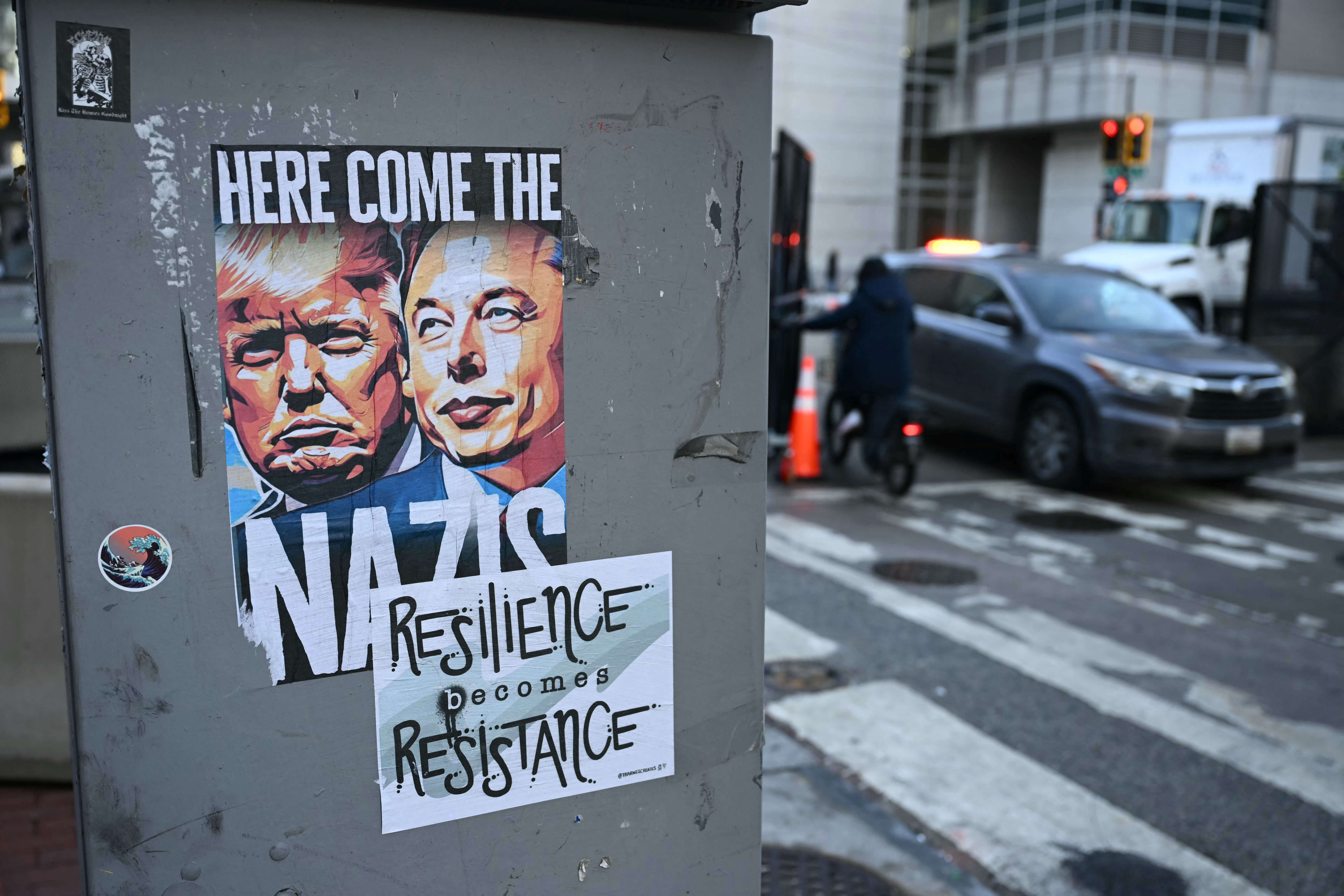
Some Jewish groups on the left have been more consistently critical of Musk, and 21 of them announced in late January that they would stop using X. “We didn’t want to be part of driving traffic to that platform,” said Barb Weinstein, associate director of the Religious Action Center of Reform Judaism.
But many major Jewish organizations, including the Jewish Federations of North America and the Conference of Presidents of Major Jewish Organizations, have remained silent on Musk since the November election, including during the intense past few weeks of his high-profile Department of Government Efficiency moves to cut federal jobs, grants, and whole agencies.
His DOGE team includes at least two officials with histories of online hate. Musk announced earlier this month that he would rehire Marko Elez, 25, who previously worked at SpaceX and had resigned from DOGE after revelations that he had posted on social media last year that he was “racist before it was cool” and wanted to “normalize Indian hate,” and that “you could not pay me to marry outside of my ethnicity.”
Another aide, Gavin Kliger, 24, shared a Nick Fuentes post mocking Black people on X just weeks before joining Musk’s effort to furlough staff at the U.S. Agency for International Development and said he was radicalized by the writings of Ron Unz, who has denied the Holocaust. Kliger said he had not read Unz’s antisemitic essays.
Musk’s support for Israel looms large
The muted response reflects the essential conundrum regarding Musk and the Jews: Jewish groups uncomfortable with some of his statements or alliances are nonetheless happy with his support of Israel and aggressive approach toward fighting anti-Zionism.
“This notion that Israel should not exist is honestly just absurd and outrageous and certainly one of the most antisemitic things that could possibly be said,” he said during the November 2023 audio chat.
Musk has worn a dog tag in solidarity with Israeli hostages, and has held three friendly meetings with Israeli Prime Minister Benjamin Netanyahu over the past 17 months. In a statement after their meeting in Washington this month, Netanyahu said Musk has “repeatedly and forcefully supported Israel’s right to defend itself against genocidal terrorists and regimes who seek to annihilate the one and only Jewish state.”
How people assess Musk’s seemingly incongruent statements regarding Jews may come down to their support for his worldview in which white people — including most Jews — are the victims of mounting discrimination caused by the “woke mind virus.”

In both conversations with Shapiro, Musk recounted how a New York City high school student once told him that Mossad, the Israeli intelligence service, was responsible for the 9/11 attacks. “I’m like what — this is insane,” Musk recalled in November 2023. “The kids are being taught in elite high schools and colleges to hate America and hate many things and question the right of Israel to exist and I’m like, what the hell is going on?”
In a subsequent interview with Shapiro, Musk criticized “pro-Hamas demonstrations” at top universities and blamed “diversity, equity and inclusion.”
“What it really means is discrimination on the basis of race, sex,” Musk said. “It’s against merit and thus I think it’s fundamentally antisemitic.”
Yet even the Jews who are inclined to agree with Musk’s analysis of antisemitism do not generally engage with the far right like Musk does. He followed up the salute controversy with not only the Holocaust jokes but also a speech to a conference of Germany’s far-right AfD party, where he said Germans needed to get over “past guilt.”
“The MAGA agenda is a complicated mixture of antisemitism and philosemitism,” said Lorber, who researches the far right. “They view themselves as wanting to defend some Jews who they see as victims, especially if it helps them attack BLM and DEI.”
Musk has generally reacted to the outcry over offensive posts on X with an air of impunity (“Go f— yourself,” he told advertisers who wanted to leave the site over the antisemitic post he endorsed in November 2023). There’s no sign of that changing. Last week, someone purchased an advertisement for Adolf Hitler on X, showing the Nazi leader posing with smiling children.
And then there was the curious case of Musk’s team claiming that it had stopped the U.S. from sending $50 million of condoms to Gaza. Musk spotlighted the grant as a outrageous example of USAID spending, and was quickly praised by pro-Israel influencers who claimed Hamas was planning to use the condoms as explosive balloons.
But the story was debunked almost immediately: There was never any data that showed such spending, and the White House never offered evidence. When confronted about this two weeks later Musk was unapologetic.
“Some of the things that I say,” Musk told reporters from the Oval Office, “will be incorrect.”
A message from our Publisher & CEO Rachel Fishman Feddersen

I hope you appreciated this article. Before you go, I’d like to ask you to please support the Forward’s award-winning, nonprofit journalism so that we can be prepared for whatever news 2025 brings.
At a time when other newsrooms are closing or cutting back, the Forward has removed its paywall and invested additional resources to report on the ground from Israel and around the U.S. on the impact of the war, rising antisemitism and polarized discourse.
Readers like you make it all possible. Support our work by becoming a Forward Member and connect with our journalism and your community.
— Rachel Fishman Feddersen, Publisher and CEO










